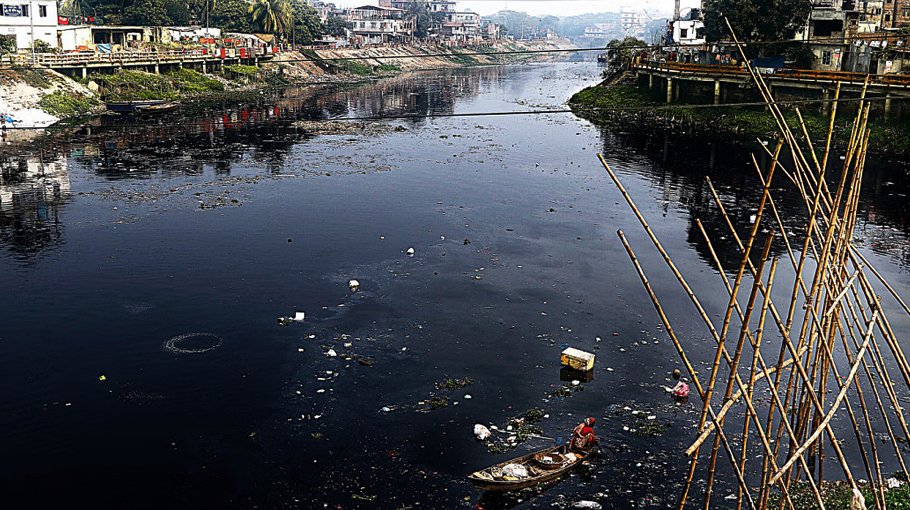Existing law not enough to protect rivers

Existing legal framework misses the cultural and indigenous epistemic foundations for ‘nature’s rights’ in the Bengal Delta.
Although the National River Conservation Commission (NRCC) is the government regulatory agency and statutory body responsible for protecting rivers in Bangladesh, the NRCC has not taken any legal initiative on behalf of any rivers in the past ten years.
The government body, however, appears to be driven more by individual leadership motivations rather than adhering strictly to its prescribed charters. On the other hand, the NRCC contends with internal competition among various government bodies and grapples with insufficient coordination.
Some experts on water and river and environmentalists think that this distinct model featuring an apex body seems to foster a fragmentation of efforts, hindering collaboration among communities and civil society organizations in advocating for river conservation.
They stressed that the NRCC should work as per its prescribed charters and play a vital role in river protection.
Dr Muzibur Rahman Howlader, former chairman of the National River Conservation Commission (NRCC), said that the government agencies in charge of river conservation do very little to save the country’s rivers. “During my tenure, I visited 30 districts and prepared a list of grabbers. All went unheard. Those in charge of conservation of rivers must be held accountable, if we really want to save the rivers,” he said.
Talking to the Daily Bangladesh Post, he, however, called upon the government to increase institutional capacity and empower the NRCC.
Alongside the responsibility of the NRCC, the experts on water and river and environmentalists also emphasized on ensuring legal rights
for adequate protection of rivers. “Only legal rights will ensure adequate protection for our rivers,” said Mohammad Azaz, chairman of River and Delta Research Centre (RDRC). The RDRC, however, published a policy brief titled ‘River Rights: Navigating Challenges to Flow Freely’. It was released on March 14 on the occasion of the International Day of Action for Rivers.
It was said in the Policy Brief that the newly established legal entities of rivers are seamlessly integrated into the existing water governance framework following the High Court judgment.
The policy brief discusses the field of law, anthropology, economics, planning, and resource governance aims to investigate the socio-legal meaning and implications of the rights of the rivers in the context of Bangladesh, thereby contributing to the ongoing global discourse on nature's rights.
The RDRC said in the policy brief that although rights of rivers have been legally recognized in Bangladesh, protection for rivers in practice is not guaranteed. However, the existing legal framework misses the cultural and indigenous epistemic foundations for ‘nature’s rights’ in the Bengal Delta.
This policy proposal of RDRC also addresses a crucial aspect of environmental justice in Bangladesh where rivers are central to the country’s ecosystem and livelihoods.
In recent years, the concept of granting legal rights to rivers has gained significant attention worldwide. Bangladesh, a riverine country comprising about two-thirds of the active Bengal Delta, faces various challenges related to river degradation, pollution, and overexploitation.
The rivers globally face imminent threats. As urban populations burgeon, water-stressed towns and cities are contemplating the utilization of environmental flows as a prospective water source. Where river vitality clashes with people’s water rights, it becomes imperative for rivers to be empowered with a strong and effective advocacy to assert their interests in these discussions.
Mohammad Azaz said that integrated water resource management necessitates a unified and cooperative strategy for water utilization, fostering collaboration among diverse users. The essential foundation of the human right to water relies on the preservation of robust, operational aquatic ecosystems that ensure the provision of secure freshwater resources.
The global movement advocating for the acknowledgment of legal rights for rivers is fundamentally rooted in the interplay between human communities and their geographical surroundings. This movement aims to reconcile human water rights with the need for environmental flows in emerging water reserves, safeguarding them from potential exploitation for commercial water needs in the future.
More rivers globally are granted legal rights and acknowledged as legal entities. In New Zealand and Colombia, the rivers received legal rights as part of a broader recognition of cultural values and the connection between people and the river.
In New Zealand, the Whanganui River attained legal recognition as a person, aligning with the Māori perspective that considers the river as an ancestral entity deserving care. In Colombia, the Río Atrato was granted legal rights as part of a comprehensive initiative mandated by the Constitutional Court to safeguard the well-being of communities within the river basin.
By aligning river rights with human values, these legal measures have become integral to the social, cultural, and economic fabric, avoiding the perception of rivers as potential rivals to humans and instead, weaving the destiny of the rivers into the intricate tapestry of human values.
India presents a compelling counterargument: the foundational underpinnings of legal rights are subject to intense controversy, given their derivation from Hindu religious principles while overlooking the myriad communities residing along the Ganga, whose lives and livelihoods are intricately linked to the river's well-being.
Mohammad Azaz said that it is imperative for policymakers to articulate a clear understanding of the role that these newly designated legal entities will assume in the realm of water governance. The notion of providing rivers with a 'voice' becomes pertinent only when there is an expectation that they will actively compete for their own outcomes. However, this approach could be construed as an evasion of our responsibilities in environmental protection, as it implies a reliance on rivers to autonomously safeguard their well-being, he added.



